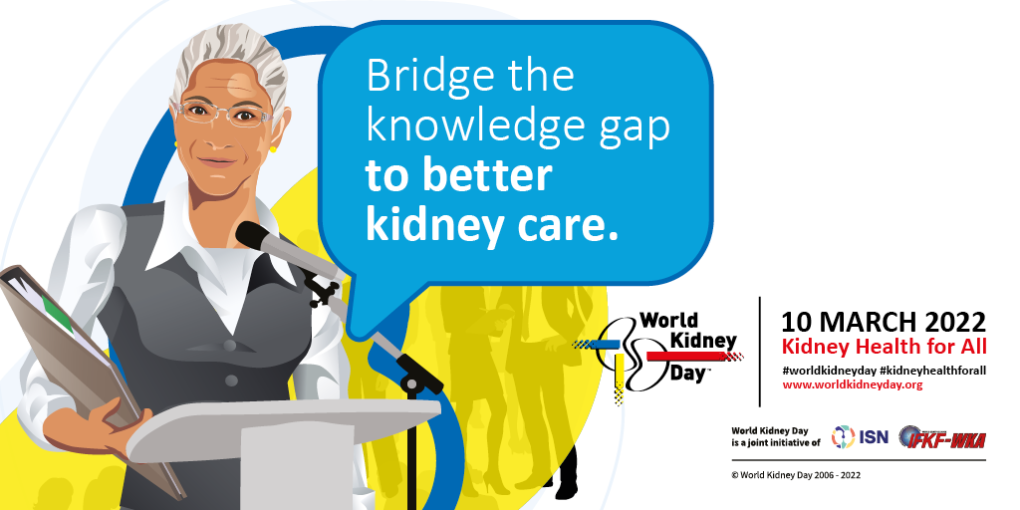Whilst kidney disease may not be as well-known as many other life-threatening illnesses, it affects millions of people worldwide.
March is the month when awareness on kidney disease is the main focus. To mark this important event and shine a light on this under-recognised illness, we’re going to look not only at its impact on someone’s day to day life, we want to give you some well needed information.
Prepared by Lurleen James:
There are two types of kidney failures Acute and Chronic.
Acute kidney failure is now known as acute kidney injury (AKI)
This has a sudden onset, where the kidney damage can happen within a few hours, or a few days it causes a build-up of waste products in the blood and makes it hard for the kidneys to keep the right balance of fluid in the body. There is a rapid fall in the rate of glomerular filtration. (Normal eGFR IS 120ML/Minutes)
Decreased glomerular rate manifest clinically as an abrupt and sustained increase in the serum levels of urea and creatinine with disruption of salt and water balance in the body. This condition can be reversed.
This article, will focus on the chronic kidney disease
Chronic renal failure: This is now known as chronic kidney disease (CKD)
- The kidneys filter waste and excess fluid from the blood, these are then removed in your urine.
- This condition occurs by a gradual loss of kidney function over time.
- This condition is irreversible.
- CKD is a long-term condition where the kidneys do not work as well as they should.
- This condition can be fatal if not treated.
Causes of CKD:
- Diabetes
- High Blood Pressure
- Heart (cardiovascular) Disease
- Smoking
- Obesity
- Been Black, Native American, and Asian
- Family History of Kidney Disease
- Abnormal Kidney Structure: (Polycystic kidneys, kidney stones, enlarge prostate).
- Analgesic Abuse (NSAIDS)
- Long- term use of some medicine ie Lithium use for psychiatric patients
- Glomurela Disease
- Persistent Urinary Tract infection
- Lupus Nephritis
- Cancer of the Kidneys
Symptons of CKD:
- Fatigue
- Swelling in hands, legs and feet
- Itching
- Shortness of Breath
- Loin Pain
- Decrease Appetite
- Vomiting/ upset stomach
- Muscle Cramps
- Difficulty in sleeping
- Increase need to pass urine
Five Stages of Chronic Kidney Disease: (CKD)
Stage 1 with normal or high Glomerla Filtration Rate (GFR) > 90 ML/minute
Stage 2 mild CKD glomerula Filtration Rate 60-89 ML/ min
Stage 3 (a) moderate CKD (GFR 45-59 ML/min)
Stage 3 ( b) moderate CKD (GFR 30-44 ML/min)
Stage 4 severe CKD ( GFR 15 -29 ML/min )
Stage 5 End stage CKD(< 15 ML/min)
Diagnosis:
During the early stages, chronic kidney disease may be diagnosed if you have a blood or urine test for another reason.
In the advanced stages if you are suffering from these symptoms, such as tiredness, swollen ankles, hands and feet, having shortness of breath, feeling sick and blood in your urine consult your GP.(Doctor)
He will initially take a history and request blood works for Urea, creatinine, and FBC and Urine test. There are other investigations which will follow later such as Ultrasound scan, MRI, CT and a biopsy of your kidney to ascertain what caused your kidney failure.
Treatment:
- A lifestyle change has to be made by the individual affected
- Reduce alcohol intake if applicable
- Stop smoking
- Increase exercise
- Restricted salt intake.
- Medicine prescribed to control associated problems, ie Blood pressure, and high cholesterol.
- Depending on the individual patients – some at stage 4 they require Renal Replacement Therapy.
- But by the time they get to stage 5 the patient should have been prepared and have a function access to start dialysis treatment.
The Renal Department in hospitals have various support for the patients, Renal dietitian, Social workers and counsellors.
For further information, check out these sites:
REFERENCES:
my.clevelandclinic.org

